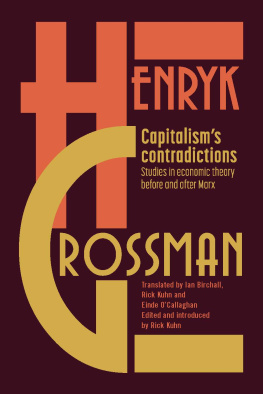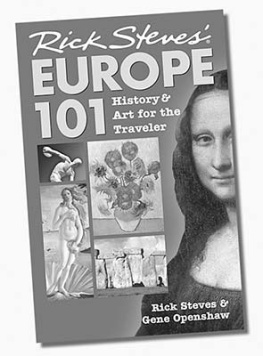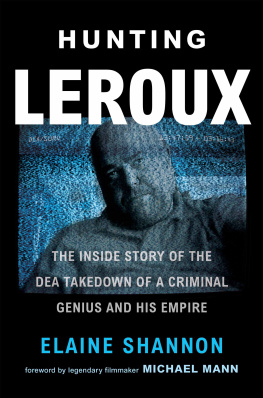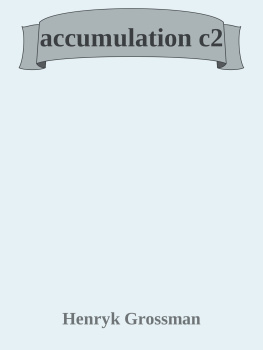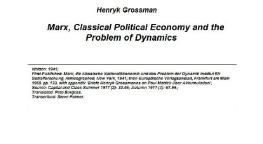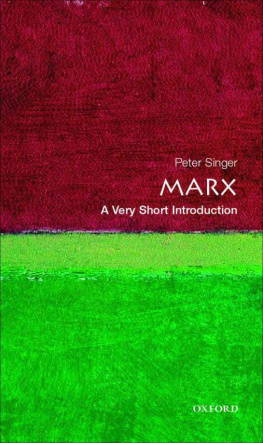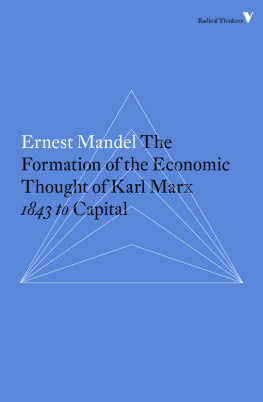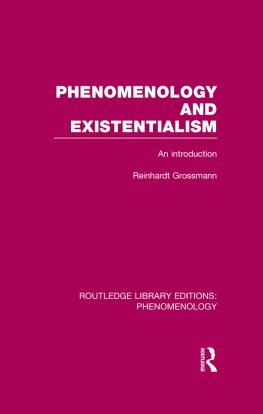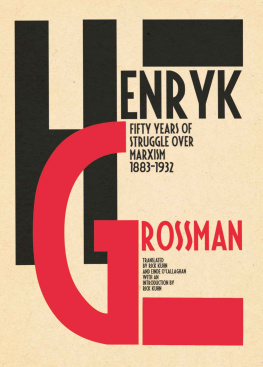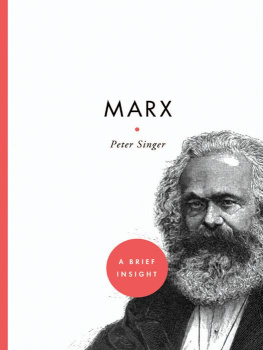Introduction
Rick Kuhn
The boundaries among Henryk Grossmans works on politics, economic history, economic theory and the history of economic thought are arbitrary. From his first publications as a leader of Jewish workers in the Austrian province of Galicia, around 1905, he was concerned to make the case for revolutionary working-class action. His economic investigations were always linked to this end.
This collection contains five of his longer studies. All deal extensively with the history of economic thought; their pivot is the work of Karl Marx. The first part of this introduction outlines Grossmans life and the content of his writings. The second part, Insights, focuses on several issues that recur in his work: aspects of Marxs theory that had been overlooked or misunderstood before Grossman and mostly still are neglected or distorted, weakening efforts to analyze contemporary capitalism in order to overthrow it.
Grossman and His Studies of Economic Theory
Born in Krakw to a bourgeois Jewish family in 1881, Grossman became active in the Polish Social Democratic Party (PPSD) of Galiciathe Polish province of the Austro-Hungarian Empireand the Jewish workers movement around the turn of the century. As the class struggle in the Austro-Hungarian Empire heated up, paralleling developments across the border in tsarist Russia that led to the revolution of 19056, Grossman was a founding leader, the secretary and the main theoretician of the Jewish Social Democratic Party (JSDP) of Galicia, established on May Day 1905. He was also involved in smuggling literature for Rosa Luxemburgs organization, the Social Democracy of the Kingdom of Poland and Lithuania, into Russian-occupied Poland. Despite the hostility of the PPSD and the federal Austrian Social Democratic Party, the JSDP grew rapidly, organized many Jewish workers into trade unions for the first time, mobilized them in struggles against their exploitation as workers and their oppression as (mainly Yiddish-speaking) Jews, undertook extensive educational and propaganda work and published a weekly newspaper. The JSDP led Jews in strikes and street protests alongside workers of other nationalities, particularly in the struggle for universal male suffrage. During this period Grossman was still a university student. After completing his first degree, he moved from Krakw to Vienna in late 1908 to continue his studies, particularly under the economic historian Carl Grnberg, the most prominent socialist academic at a university in the Austro-Hungarian Empire, with whom Grossman had already worked during the winter semester of 19067.
In his academic work before and during World War I, Grossman dealt with eighteenth-century economic policies and ideas in the Habsburg Empire. His main research project was a study of the empires trade policy for Galicia.
Poland and Sismondi
Unable to take up the offer of a senior post in the Austrian Statistical Commission in Vienna after the war, as a result of the racist policies of the new, rump Austrian state, Grossman moved to Warsaw, where he joined the Communist Workers Party of Poland in 1920. He worked for over two years at the Polish Central Statistical Office, where he was in charge of the design of the first population census of the new republic and published several articles related to his work, before being appointed to a full professorship in economic policy at the Free University of Poland. Because of his political activity, particularly in the illegal Communist Partys front organizations, Grossman was arrested five times and did prison stretches of up to eight months.
Before moving to Warsaw, Grossman delivered a paper to the Polish Academy of Science in Krakw in June 1919. This was the first evidence of his work on Marxist crisis theory. Substantial manuscripts, written in Warsaw, elaborated on these ideas and a breakthrough he achieved by extending Otto Bauers model of capitalist growth beyond just a few cycles. In Poland, apart from an abstract of the Krakw paper, he published statistical studies of the country in the past and present, a very brief defense of Marxs economic theory against critics, an introduction to his own translations of criticisms by Marx of the German socialists draft Gotha Program, which included an account of the early Polish reception of Marx, and a monograph, Simonde de Sismondi and His Economic Theories: A New Interpretation of His Thought.
Jean Charles Lonard Simonde de Sismondi was a Swiss political economist and a prolific and pioneering historian, notably of France (in twenty-nine volumes), the Italian republics of the Middle Ages (sixteen volumes), and southern European literature (four volumes). His first economic works accepted the framework established by Adam Smith. But he became critical of capitalism and classical political economy at its most sophisticated, in the work of David Ricardo. This was apparent in his two-volume New Principles of Political Economy , published in 1819 and in a revised second edition in 1827, as well as the two volumes of his Studies on Political Economy of 183738. Following the publication of the New Principles , Sismondi engaged in controversies with Ricardo as well as Jean-Baptiste Say and John Ramsay McCulloch, whom Marx identified as proponents of the first phase of vulgar political economy, which abandoned the insights of their classical predecessors.
Sismondis work on the nature of capitalism was a reference point for Karl Marx and in two major socialist controversies. The first was between Marxists, preeminently Vladimir Ilyich Lenin, and Narodniks (populists), who invoked Sismondi, over the scope for the development of capitalism in Russia. In the second, over the nature of imperialism before World War I, Rosa Luxemburg drew critically on Sismondi.
Unlike most of his predecessors, including Marxists but not Marx himself, Grossmans primary focus was not on Sismondis underconsumptionism but on its deeper causes. Like Grossmans 1919 lecture, his Sismondi monograph dealt not only with these issues, explored at greater length below, but also the way disequilibrium could be intensified as producers increased output to compensate for falling prices.
The monograph also identified the antecedents of Marxs concept of the fetishism of commodities in Sismondis work. In 1923 and 1924, Karl Korsch, Georg Lukcs and Grossman pointed out how Marx had accounted for both the material realities and the fetishized surface appearances of capitalism, for both the logic of capital accumulation and the mystifications of bourgeois economics. Sismondi had demonstrated how the fetishism of mainstream political economy, with its focus on exchange value to the exclusion of use value, fundamentally flawed its analysis.
According to Sismondi the exchange-value-based system necessarily gives rise to disproportion between production and needs and hence to crises, because production and consumption are separate.
Grossman pointed out how Sismondi had contributed to the development of a series of Marxs concepts: socially necessary labor time as the foundation of commodities values; But while Marx praised and built on Sismondis theoretical insights, he was critical of the Swiss economists policy proposals.
Sismondi, Grossman argued, had an ideal of a fundamentally different future economic system in which, thanks to the elimination of competition and exchange value, the necessary proportions for crisis-free growth could be maintained. This was Sismondis implicit maximum program. He explicitly advocated a range of palliative measures to ameliorate or slow down the destructive effects of capitalism: his minimum program. Sismondi was not an advocate of the abolition of private property, the only means by which exchange value could be dispensed with, and was therefore not a socialist. Nor, in the circumstances of the early nineteenth century, could he conceive of the working class as the agent of radical social change.
Next page
